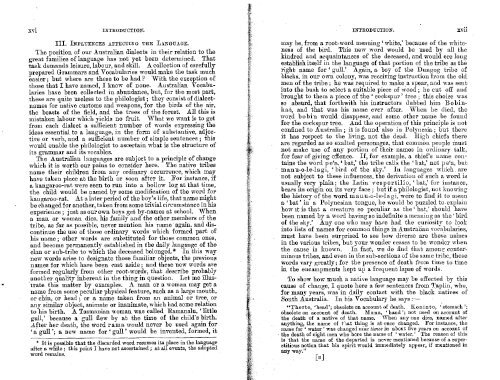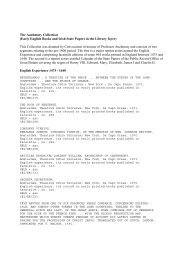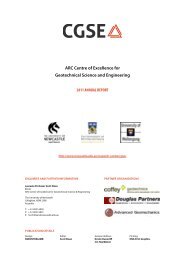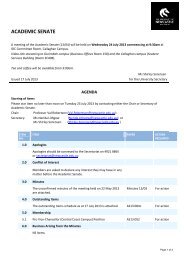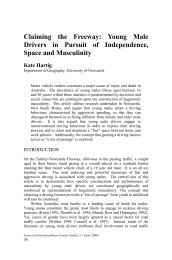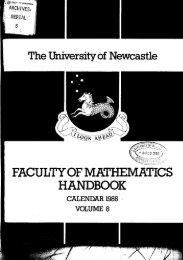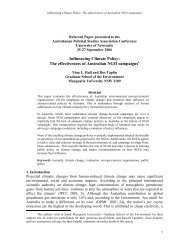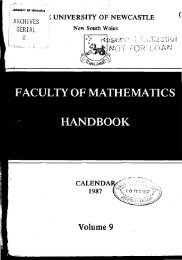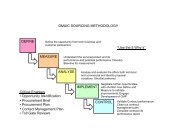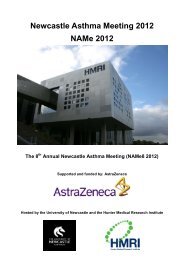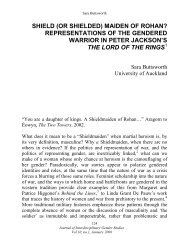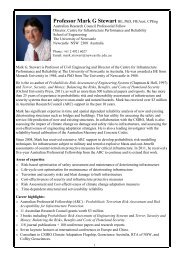n - University of Newcastle
n - University of Newcastle
n - University of Newcastle
Create successful ePaper yourself
Turn your PDF publications into a flip-book with our unique Google optimized e-Paper software.
111. I~~FLKTEKCES AFFECTIKG TEE LAKGUAGE.<br />
The position <strong>of</strong> our Australian dialects in their relation to the<br />
great families <strong>of</strong> language has not yet been determined. That<br />
task demands leisure, labour, and skill. A collection <strong>of</strong> carefully<br />
prepared Grammars and Vocabularies would make the task much<br />
easier ; but where are these to be had ? With the exception <strong>of</strong><br />
those that I have named, I know <strong>of</strong> none. Australian Vocabularies<br />
have been collected in abundance, but, for the most part,<br />
these are quite useless to the philologist; they consist <strong>of</strong> dialectnames<br />
for native customs and nTeapons, for the birds <strong>of</strong> the air,<br />
the beasts <strong>of</strong> the field, and the trees <strong>of</strong> the forest. A11 this is<br />
mistaken labour which yields no fruit. What nre want is to get<br />
from each dialect a su5cient number <strong>of</strong> words expressing the<br />
ideas essential to a language, in the form <strong>of</strong> substnative, adjective<br />
or verb, and a sufficient number <strong>of</strong> simple sentences ; this<br />
\vould enable the philologist to ascertain what is the structure <strong>of</strong><br />
its grammar and its vocables.<br />
The Australian languages are subject to a principle <strong>of</strong> change<br />
which it is worth our pains to consider here. Thc native tribes<br />
name their children from any ordinary occurrence, which may<br />
have taken place at the birth or soon after it. For instance, if<br />
a kangaroo-rat mere seen to run into a hollow log at that time,<br />
the child wouId be named by some modification <strong>of</strong> the mord for<br />
kangaroo-rat. -kt a later period <strong>of</strong> the boy's life, that name might<br />
be changedfor another, taken from some trivialcircumstance in his<br />
experience ; just as our own boys get by-names at school. When<br />
a man or woman dies, his family and the other members <strong>of</strong> the<br />
tribe, as far as poseible, never mention his name again. and discontinue<br />
the use <strong>of</strong> those ordinary words which formed part <strong>of</strong><br />
his name ; other words are substituted for those common ones,<br />
and become permanently established in the daily language <strong>of</strong> the<br />
clan or sub-tribe to which the deceased belonged." In this may<br />
new words arise to designate those familiar objects, the previous<br />
names for which have been cast aside ; and these new words are<br />
formed regularly from other root-words, that describe probably<br />
another quality inherent in the thing in question. Let me illus-<br />
trate this matter by examples. A man or a voman may get a<br />
name from some peculiar ~hysical feature, such as a large mouth,<br />
or chin, or hed; or a name taken from nI1 aaimal or tree, or<br />
any similar object, animate or inanimate, mhich had some relation<br />
to his birth. h Tasma~lian woman was called Ramanalu, ' little<br />
gull,' because a gull flew by at the time <strong>of</strong> the child's birth.<br />
After her death, the mord rama would never be used again for<br />
' a gull '; a new name for ' gull ' mould be invented, formed, it<br />
-<br />
* It is possible that the discarded word resumes its place in the language<br />
after a while ; this point I have not ascertained ; at all events, tlie adopted<br />
word remains.<br />
may be, from a root-word meaning 'white,' because <strong>of</strong> the whiteness<br />
<strong>of</strong> the bird. This new word mould be used by all the<br />
kindred and acquaintances <strong>of</strong> the deceased, and would ere long<br />
establish itself in the language <strong>of</strong> that portion <strong>of</strong> the tribe as the<br />
right name for ' gull.' Again, a boy <strong>of</strong> the Dungog tribe <strong>of</strong><br />
blacks, in our own colony, mas receiving instruction from the old<br />
men <strong>of</strong> the tribe ; he was required to malre a spear, aud was sent<br />
into the bush to select a suitable piece <strong>of</strong> mood ; he cut <strong>of</strong>f a~id<br />
brought to them a piece <strong>of</strong> the ' cockspur ' tree ; this choice mas<br />
so absurd, that forthwith his instructors dubbed him Bobinkat,<br />
and that was his name ever after. When he diecl, the<br />
word bobin mould disappear, and some other name be found<br />
for the cockspur tree. And the operation <strong>of</strong> this priuciple is not<br />
confined to Australia ; it is found also iu Polyilesia ; but there<br />
it has respect to the living, not the dead. High chiefs there<br />
are regarded as so exalted personages, that common people must<br />
not make use <strong>of</strong> any portion <strong>of</strong> their names in orclinary talk,<br />
for fear <strong>of</strong> giving <strong>of</strong>fence. If, for example, a chief's name contains<br />
the word pe'a, ' bat,' the tribe calls the ' bat,' not pe'a, but<br />
manu-0-le-lagi, ' bird <strong>of</strong> the sky.' In languages 11-llich are<br />
not subject to these influences, the derivatioll <strong>of</strong> such a word is<br />
usually very plain ; the Latin vespertilio, ' bat,' for instance,<br />
bears its origin on its very face ; but if a philologist, not linowing<br />
tbe history <strong>of</strong> the mord manu-o-le-lagi, were to find it to mean<br />
a 'bat' in a Polynesian tongue, he would be puzzled to.esplain<br />
how it is that a creature so peculiar as the ' bat,' should have<br />
been named by a word having so indefiuite a meaning as the ' bird<br />
<strong>of</strong> the sky.' Any one \~-11o may have had the curiosity to look<br />
into lists <strong>of</strong> names for common things in Australiall vocabularies,<br />
must have bee11 surprised to see how di~~erse are these naines<br />
in the various tribes, but your wonder ccases to be wonder when<br />
the cause is kuomn. In fact, we do find that amoil% conterminous<br />
tribes, and even in the sub-sections <strong>of</strong> the same tribe, these<br />
words vary greatly; for the presence <strong>of</strong> death from time to time<br />
in the encampments kept up a frecluent lapse <strong>of</strong> words.<br />
To show how much a native language may be effected by this<br />
cause <strong>of</strong> chauge, I quote here a few sentences from I'aplin, who,<br />
for many years, was in daily contact with the black natives <strong>of</strong><br />
South Australia. In his Vocabulary he says :-<br />
"Therto, 'head'; obsolete on account <strong>of</strong> death. Koninto, ' stomach ';<br />
obsolete on account <strong>of</strong> death. Muna, ' hand '; not used on account <strong>of</strong><br />
the death <strong>of</strong> a native <strong>of</strong> that name. When ally one dies, named after<br />
anything, the name <strong>of</strong> t>at thing is at once changed. For instance, the<br />
name for ' water ' was changecl ?line tifnes in about five years on acconnt <strong>of</strong><br />
the death <strong>of</strong> eight inen who bore the name <strong>of</strong> 'water. The reason <strong>of</strong> this<br />
is that the name <strong>of</strong> the departed is never mentioned because <strong>of</strong> a superstitious<br />
notion that his spirit would imnlediately appear, if meniloned in<br />
any way."<br />
r.1


